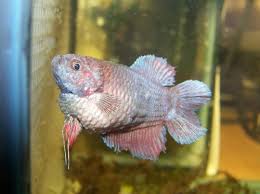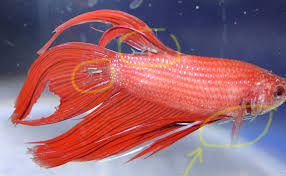"The Best Medicine is Prevention"
Your betta should not sick easily if you doing regular water maintenance
and heat your tank at constant temperature. Most of disease are come
from dirty water, unstable temperature. Another way to prevent sickness
on betta is giving a healthy diet and not overfeeding them.
NOTE
Below, I have listed the most common
betta diseases, their individual symptoms, and listed the medications I
have used in the past to try to fight each disease off. Please go down
the list and see which symptoms/disease seem to qualify. Please note
that I do not guaranty that the treatment I recommend will work and
cannot predict what effect it will have on your specific betta.
Therefore you use this chart and info AT YOUR OWN RISK.
Signs your betta might be sick :
- a lifeless or tired betta
- color loss
- abnormalities on fins or scales
- activity levels drop
- won't eat
- Parasitic
- Bacterial
- Fungal
- Injury and conditioning
Types of illnesses:
Columnaris

Symptoms :
- Stringy, white,grey, or off-white "wool" on the mouth, gills or face.
- Can also appear as a band around the dorsal fin
Treatment :
- Do a full water change
- Temperature should not higher than 74°F (Columnaris will breed at 76°F)
- Provide aeration to the tank
Dropsy

Symptoms :
External Parasites

- Bloated stomach.
- Scales standing out (like a pinecone)
Treatment :
- Isolate betta immediately in a quarantined tank
- Sanitize all shared equipment.
- Dropsy is nearly always fatal once the symptoms start to show
- Treat infected fish with an anti-bacterial medicine
External Parasites
Symptoms :
Fin Rot

- Will scratch against rocks and decoration.
- Sometimes you can see tiny worms
- Change of behavior, most commonly hyperactivity
Treatment :
- Do a full water change and wash all decoration in the tank
- Use an anti-parasitic treatment
Fin Rot
Symptoms :
- Fin rot normally comes from dirty water.
- Tail will start to dissolve
- Black or red marks will show up around the edges of the fins
Treatment :
- Do a full water change and wash all decoration in the tank
- Use an anti-bacterial or fungus remover
- Find rot is contagious, keep fish and equipment used separate.
Ich
Symptoms :
Internal Parasites
- Betta has white dots over his body and head.
- May scratch against rocks or decoration
- Decrease in activity
Treatment :
- Sanitize all shared equipment.
- Do a full water change.
- Raise the temperature to 85°F
- Use an anti-parasitic treatment
Internal Parasites
Symptoms :
- Betta appears to be losing weight although is eating normally.
- White stringy poop
Treatment :
- Do a full water change.
- Treat with an anti-bacterial medicine
Pop-eye
Symptoms :
- One or both of the eyes will start to bulge out.
- Will worsen over a 2-10 days period.
Treatment :
- Do a full water change.
- Treat with an anti-bacterial medicine.
Swim Bladder Disorder
Symptoms :
- Problems swimming(float and/or sink)
- Will sometimes lay on the bottom
Treatment :
- Feed A LOT less than what you are currently feeding
- If the betta cannot eat, lower the water level so it can reach the food.
Septicemia
Symptoms :
- Redness under the scales(may appear more visible around the face).
- Caused by bacteria in live foods or due to injuries
- Invected wounds will be grey, black or fuzzy.
Treatment :
- Do a full water change.
- Use an anti-bacterial treatment
Velvet
Symptoms :
- Can be spotted with a flashlight.
- Betta will look like it is covered in a gold or rust colored dust.
- Look for clamped fins, scratching behavior, loss of appetite, or loss of color
Treatment :
- VELVET IS VERY CONTAGIOUS.
- Isolate betta immediately.
- Do a full water change.
- Use an anti-parasitic treatment
- Sterilize all shared equipment